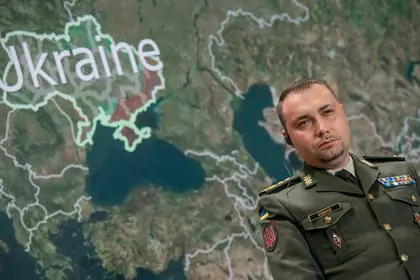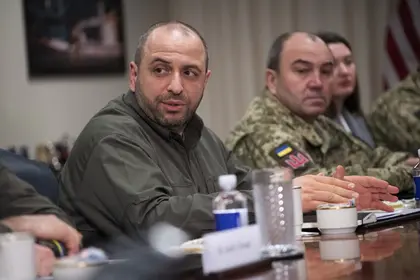Kyrylo Budanov, head of Ukraine’s Defense Intelligence (HUR), said the upcoming months would be “difficult” for Ukraine with the renewed Russian offensives but stressed that it won’t be “catastrophic.”
During the interview with BBC Ukraine, Budanov also commented on the recent downing of the Russian Tu-22MZ strategic bomber – the first in the current war – as well as Russia’s hybrid operations and other upcoming challenges for Ukraine.
JOIN US ON TELEGRAM
Follow our coverage of the war on the @Kyivpost_official.
Here are the five things to know from Budanov’s BBC interview.
“Same means” used to destroy the A-50 reconnaissance plane and Tu-22MZ strategic bomber
While Budanov refused to provide the specifics of the operation that downed the Russian Tu-22MZ strategic bomber on April 19, he said the plane was hit “at a distance of 308 km” and that “the same means” was used to down a Russian A-50 airborne early warning and control aircraft “in the air,” though it’s unclear if he was referring to the downing in January or February – or both.
This confirms that Soviet-made S-200 missiles – with a range of approximately 300 km – were also used to down the A-50s. As for target tracking, a Western advisor to HUR told Kyiv Post that NATO surveillance aircraft were involved in directing the strike against the planes.
Budanov also described the operation as an “ambush,” where the HUR was awaiting the right opportunity.

Ukrainian Intel Drones Strike Russia’s Oil Depot in Tula, Igniting Fire, Sources Say
War “difficult” but not “Armageddon” in near future
Budanov said Ukraine is “anticipating a rather difficult situation shortly” and that issues would likely arise “from mid-May” without elaborating on the issues.
“Yes, there are problems at the front, but we must also say frankly that these same problems did not appear today, and not a month ago, and not even three months ago. This is a systemic problem that we are facing,” said Budanov.
However, Budanov emphasized the difference between “difficult” and “catastrophic,” and he reiterated that “nothing extraordinary” is to be expected in the coming months.
While it is not immediately clear what threats Budanov was referring to, he did mention a “multifaceted approach” and “complex operation” Russia is planning against Ukraine during the interview, where Russia is reportedly planning a “Maidan-3” by instigating anti-government movements – not under a pro-Russian banner – to destabilize Ukrainian society.
On the military front, Ukrainian President Volodymyr Zelensky said on Sunday that he expects Moscow to step up its offensive in Chasiv Yar in eastern Ukraine and attempt to capture the town by May 9 to declare a symbolic victory.
In a recent interview with the Washington Post, Budanov also predicted that Russia would start a new offensive in June to seize the whole of Donetsk and Luhansk regions.
Russia “effectively overcame sanctions”
Budanov said the Kremlin managed to accumulate a number of missiles during 2023, which they produced domestically as they “quite effectively overcame sanctions,” but there’s no evidence that China provided direct assistance in manufacturing missiles, nor is it supplying or has plans to supply any ready-made weapons to Russia.
“And who helps? No one helps, they work by themselves. They quite effectively overcame sanctions, circumvention of sanctions, and so on.”
Budanov’s indirect response to Washington’s request to halt oil refinery strikes
In March, the Financial Times (FT) reported that US officials were allegedly telling Ukraine’s intelligence not to strike Russian oil refineries in fear of market instability and rising oil prices, where statements from US officials later cemented the reports.
When asked if the West “[expressed] any criticism in the conversation” with him, Budanov simply emphasized the “partnership” between Ukraine and the West, and that Kyiv “must not forget” about the interests of its allies while conducting the operations.
“I don't see anything wrong in having a normal conversation with our partners. Because if we call them partners, we must not forget about them, since one-sided partnership is parasitism. This is my answer to you,” said Budanov.
Earlier, Budanov told the Washington Post that deep strikes within Russia were meant to show its general population that Russian President Vladimir Putin cannot “protect the population from the war getting into Russia.”
Telegram remains “a huge problem” for Ukraine
Budanov criticized the anonymous nature of Telegram channels and called it “a huge problem” for Ukraine due to the popularity of the social media platform in news dissemination, and that something needs to be done.
“Or, as they say, to organize it all – to bring order to it, at least legally force everyone to register, so that it is clear who is behind which media resource, and Telegram has definitely acquired the status of a media.
“There is no question of influence or pressure – that is not the question. If you want to prove your position – and someone may not like it, and this is normal in a democratic society – take responsibility. Why are you afraid to say who you are?” said Budanov.
In March, lawmakers submitted a draft law to consider platforms such as Telegram and Instagram as media entities subject to government regulations.
You can also highlight the text and press Ctrl + Enter










